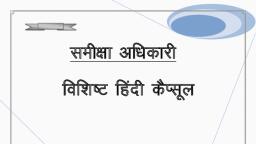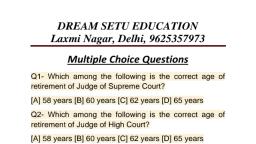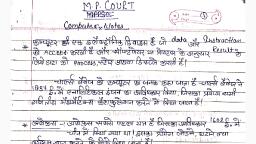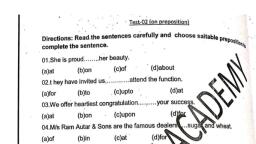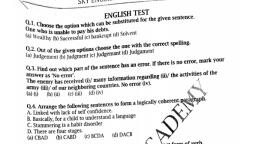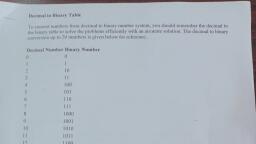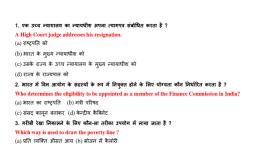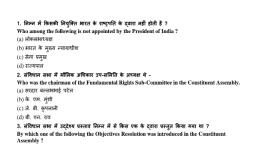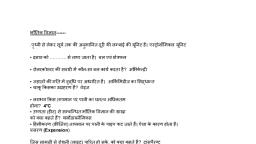Question 1 :
<b> Read the following passage carefully and answer the questions</b> <br/> <b>that follow by selecting the most appropriate option.</b> <br/>The public distribution system, which provides food at low prices, is a subject of vital concern. There is a growing realization that though India has enough food to feed its masses two square meals a day, the monster of starvation and food insecurity continues to haunt the poor in our country.<br/> Increasing the purchasing power of the poor through providing productive employment leading to rising income, and thus good standard of living is the ultimate objective of public policy. However, till then, there is a need to provide assured supply of good through a restructured, more efficient and decentralized public distribution system (PDS). Although the PDS is extensive it is one of the largest such systems in the world - it has not reached the rural poor and the remote places. It remains an urban phenomenon, with the majority of the rural poor still out of its reach due to lack of economic and physical access. The poorest in the cities and the migrants are left out, for they generally do not possess ration cards. The allocation of PDS supplies in big cities is larger than in rural areas. In view of such deficiencies in the system, the PDS urgently needs to be streamlined. Also, considering the large food grains production combined with food subsidy on one hand and the continuing slow starvation and dismal poverty of rural population on the other, there is a strong case for making PDS target group oriented. By making PDS target group oriented, not only the poorest and the neediest would be reached without additional cost but we can also reduce the overall costs incurred.<br/>The public distribution system, which provides food at ______ is a subject of vital concern.<br/>
Question 2 :
<b> Read the following passage carefully and answer the questions</b> <br/> <b>that follow by selecting the most appropriate option.</b> <br/> Nammescong Creek flowed into the backs of my thighs as I fished, pausing between casts to secure my balance in the current and admire a new hatch of pale yellow mayflies lift from the stream. Over my shoulder, the sun dropped into a farmer's cornfield, the final patch of orange light on the water enough for me to spot the small, vaguely metallic object at my feet. Retrieving it, I ran my thumb over its raised lettering, rubbing away the mud and a string of algae. A name appeared, along with an expiration date. June 1984. I had discovered arrowheads here in the past, so it didn't seem misplaced to find a tool used by modem man to obtain a meal.<br/> I took a moment to consider how the card had come to rest in the bed of the Nammy. I thought maybe there was a story in it. I was curious to know if the owner had lost his wallet while fishing, the whole trip ruined the second he'd inventoried his cash or dug out his license for a game warden. Over time the leather would've rotted into fish food, with the scoured plastic remaining I wondered how many miles the card might have ridden on spring floods over the past quarter of a century. For all I knew he could've been robbed, the thieves stripping out the money and tossing the billfold away later as they crossed a bridge.<br/> Looking him up and phoning. I recited the card number and issuing bank. He laughed, recalling it as the first, credit account he'd ever taken out, a line of imaginary cash in those years when he had no real money. But that finally changed, he explained, after an industrial accident cost him his left eye, the payoff from the plant enabling him to retire eight years earlier than expected and move to a small hobby farm in southern Virginia. He told me a glass eye wasn't his style, so he had taken to wearing an eyepatch which his wife still hates and his grandchildren — ages three, five, and seven — have always loved, as it makes Grandpop look like a pirate. He called them his Miracle Grandbabies, born to a daughter who struggled with alcohol and drug addiction for years — her rock-bottom in 1984, a year before she cleaned up for good.<br/> But in the end the man couldn't remember ever losing his wallet, either by accident or theft. He said he'd never fished the Nammy that, in fact, he'd always thought the sport a little boring, and so I came to realize there was no story here.<br/> <br/>'The whole trip ruined' was because of the<br/>
Question 4 :
<b> Read the following passage carefully and answer the questions that follow by selecting the most appropriate option.</b> <br/> Every evening, some part of the British Commonwealth hears the chimes of Big Ben, largest of the bells in the clock tower of the Palace of Westminster. The bell is popularly called Big Ben, and it is this bell which chimes out the quarter hours to the people of London. For Britons at sea or living in distant lands, the sound of Big Ben is still a link with home, for the chimes are broadcast each evening by the British Broadcasting Corporation.<br/> Big Ben has been chiming out the quarter hours now for more than one-and-a-half centuries. It started chiming on June 11, 1859. At that time, the Parliament couldn't decide what to name the bell. A light-hearted Member of Parliament called attention, in a speech, to the impressive bulk of Sir Benjamin Hall, Queen Victoria's Chief Lord of the Woods and Forests.<br/> “Call it Big Ben,” said the speaker, and the name stuck.<br/> Big Ben is 9 feet in diameter, 7 feet 6 inches tall, and the thickness where the hammer strikes in 8.75 inches.<br/> The clock that regulates the chiming of Big Ben keeps good time. In 1939, the Royal Astronomer made a 290-day check on the performance of the clock. He found that during this test, the margin of error was less than two-tenth of a second in 24 hours on 93 days and greater than one second only on 16 of the 290 days.<br/> There was an unexpected lapse on August 12, 1945, and consternation swept through the Ministry of Works. On that dark day, the clock was five minutes slow. A flock of starlings had roosted on the minute hand.<br/> <br/>People outside London can hear the chimes of the Big Ben because<br/> <br/>
Question 5 :
<b> Read the following passage carefully and answer the questions</b> <br> <b>that follow by selecting the most appropriate option.</b> <br> <br> Nammescong Creek flowed into the backs of my thighs as I fished, pausing between casts to secure my balance in the current and admire a new hatch of pale yellow mayflies lift from the stream. Over my shoulder, the sun dropped into a farmer's cornfield, the final patch of orange light on the water enough for me to spot the small, vaguely metallic object at my feet. Retrieving it, I ran my thumb over its raised lettering, rubbing away the mud and a string of algae. A name appeared, along with an expiration date. June 1984. I had discovered arrowheads here in the past, so it didn't seem misplaced to find a tool used by modem man to obtain a meal. <br> I took a moment to consider how the card had come to rest in the bed of the Nammy. I thought maybe there was a story in it. I was curious to know if the owner had lost his wallet while fishing, the whole trip ruined the second he'd inventoried his cash or dug out his license for a game warden. Over time the leather would've rotted into fish food, with the scoured plastic remaining I wondered how many miles the card might have ridden on spring floods over the past quarter of a century. For all I knew he could've been robbed, the thieves stripping out the money and tossing the billfold away later as they crossed a bridge. <br> Looking him up and phoning. I recited the card number and issuing bank. He laughed, recalling it as the first, credit account he'd ever taken out, a line of imaginary cash in those years when he had no real money. But that finally changed, he explained, after an industrial accident cost him his left eye, the payoff from the plant enabling him to retire eight years earlier than expected and move to a small hobby farm in southern Virginia. He told me a glass eye wasn't his style, so he had taken to wearing an eyepatch which his wife still hates and his grandchildren — ages three, five, and seven — have always loved, as it makes Grandpop look like a pirate. He called them his Miracle Grandbabies, born to a daughter who struggled with alcohol and drug addiction for years — her rock-bottom in 1984, a year before she cleaned up for good. <br> But in the end the man couldn't remember ever losing his wallet, either by accident or theft. He said he'd never fished the Nammy that, in fact, he'd always thought the sport a little boring, and so I came to realize there was no story here. <br> <br>There was no story because
Question 6 :
<b> Read the following passage carefully and answer the questions </b> <br/> <b>that follow by selecting the most appropriate option.</b> <br/>Heights of Abraham are cliffs. These are one of the outstanding natural features of the city of Quebec in Canada and were the scene of a famous battle. Major General James Wolfe (1727-59) was only thirty-two years old when commanded by the British Prime minister, William Pit, to capture Quebec from the french during the seven year war (1756-63). The capture of the city lying on the banks of the St. Lawrence river in Eastern Canada, would open the way for the overthrow of the French forces in North America. For three months in the summer of 1759, Wolfe attempted to overcome the French by frontal attack from across the river, but the defenders held an almost impregnable position. Wolfe decided to make an attack from the rear in the early, dark hours of September 13. He held his army across the river above the town and surprised the French soldiers guarding the small cove which now bears his name. Then came the highly dangerous task of scaling the cliffs - the Heights of Abraham. By sunrise Wolfe and his army of 4000 had achieved their goal and were on the Plains of Abraham drawn up in battle array and ready to fight.<br/> Before Wolfe's audacious plan had been carried to its successful conclusion, both Wolfe and the great French Commander, Montcalm, lay dying in the battlefield. Knowing that success was his, Wolfe whispered, I die contented.' On the other hand, when told that he was fatally wounded, Montcalm cried out. `Thank God! I shall not live to see the surrender of Quebec.'<br/>Spirit of patriotism was exhibited by<br/>
Question 7 :
<b>Read the following passage carefully and answer the questions that follow by selecting the most appropriate option.</b> <br/> Nothing succeeds like success, is an old saying and it is very true. Once you are successful and established, no matter what your formula to success it gets accepted and recognized as worthy of emulation. I meet many parents whose children say that they need not continue with their college studies, quoting the example of bill Gates who dropped out of Harvard and became the world’s richest person. But these children do not see the other great virtues that propelled Gates to invent ‘Windows’ and succeed. Without these, the chances of replicating Gates by merely dropping out of the system to be successful is as much as that of finding snowflakes in Sahara.<br/> It is the same perception that pervades the minds of many people that being successful is an end in itself. Not true at all. I have read many articles by very successful people an seen life to realise that holding on to success is often more difficult than being successful. Ask many of our cricketers who have had success get to their heads or have had to battle indifferent form. Ask the superstars who became rich, successful and led troubled lives, became bankrupt and died young. And that long list begins with Micheel Jackson and includes Amy Winehouse and goes a long way to Marilyn Monroe.<br/> <br/>Holding on to success is more difficult than becoming successful because<br/>
Question 9 :
<b>Read the following passage carefully and answer the questions that follow by selecting the most appropriate option.</b> <br/> Nothing succeeds like success, is an old saying and it is very true. Once you are successful and established, no matter what your formula to success it gets accepted and recognized as worthy of emulation. I meet many parents whose children say that they need not continue with their college studies, quoting the example of bill Gates who dropped out of Harvard and became the world’s richest person. But these children do not see the other great virtues that propelled Gates to invent ‘Windows’ and succeed. Without these, the chances of replicating Gates by merely dropping out of the system to be successful is as much as that of finding snowflakes in Sahara.<br/> It is the same perception that pervades the minds of many people that being successful is an end in itself. Not true at all. I have read many articles by very successful people an seen life to realise that holding on to success is often more difficult than being successful. Ask many of our cricketers who have had success get to their heads or have had to battle indifferent form. Ask the superstars who became rich, successful and led troubled lives, became bankrupt and died young. And that long list begins with Micheel Jackson and includes Amy Winehouse and goes a long way to Marilyn Monroe.<br/> <br/>Which of these should be a pre-reading activity for the students?<br/>
Question 10 :
While learning vocabulary, learners connect one word with its related words and the words which can occur before and after it. What is this technique called?<br/>
Question 12 :
<b> Read the following passage carefully and answer the questions that follow by selecting the most appropriate option.</b> <br/>It is your duty to train and develop your mind and acquire knowledge, as much knowledge as you possibly, can obtain. Knowledge is like a deep well, fed by perennial springs and your Mind is the little bucket that you drop into it: you will get as much as you can assimilate. The Brain, which is the physical organ of the mind, is one of the two precious products of the aeons of Evolution: the other is the imponderable “Social instinct”. This wonderful Brain, whose every convolution represents millions of years of Time, really distinguishes you from the animals. Many animals have very powerful sense organs; the eagle, the ant and the dog have keener sense of sight than Man. But no animal has a more evolved Brain and higher Intelligence. If you do not develop and use this Brain to the utmost of your power, you are more akin to the beasts than to Homo-sapiens.<br/> Knowledge and mental self-culture will confer untold blessings upon you. You will not be the victim of superstition and demagogy in religion and politics. You will know your duty and do it. To be wise and independent in your religion and your politics, not to be doped and duped by the selfish priests and the scheming politicians of Capitalism and so called socialism: is this not a noble aim worth striving for? Most men and women today are not free and wise: they are like kites flown by the priests and politicians who hold the string. They are fleeced and fooled on account of their ignorance. Half the ills of man are due to ignorance.<br/>If one acquires knowledge and develops mental self-culture, one will not be the victim of<br/>
Question 13 :
A student has difficulty in applying the learned knowledge e.g. in word problems, the student also fails to translate sentences into equations or identify the variables. A possible solution to this problem could be<br/>
Question 15 :
An activity asks students to determine from a list of possible answers with a title, what kind of information will appear in an input text before an audio recording is played. Here, students are<br/>
Question 16 :
<b>Read the following poem carefully and answer the questions by selecting the most appropriate option.</b> <br> <br> I heard a thousand blended notes <br> While in a grove I sat reclined, <br> In that sweet mood when pleasant thoughts <br> Bring sad thoughts to the mind. <br> To her fair works did Nature link <br> The human soul that through me ran; <br> And much it grieved my heart to think <br> What man has made of Man. <br> Through primrose tufts, in that sweet homer <br> The periwinkle trail’s its wreaths; <br> And’ tis may faith that every flower <br> Enjoys the air it breathes. <br> The birds around me hopp’d and play’d <br> Their thoughts I cannot measure, - <br> But the least motion which they made <br> It seem’d a thrill of pleasure. <br> The budding twogs spread out their fan <br> To catch the breezy air; <br> And I must think, do all I can <br> That there was pleasure there <br> If this belief from heaven be sent, <br> If such be Nature’s holy plan <br> Have I not reason to lament <br> What Man has made of Man? <br> <br>“In that sweet mood when pleasant thoughts bring sad thoughts to the mid”. Explain the contradiction in the statement.
Question 17 :
<b> Read the following poem carefully and answer the questions that follow by selecting the most appropriate option.</b> <br/>I wander’d lonely as a cloud<br/> That floats on high o’er vales and hills.<br/> When all at once I saw a crowd.<br/> A host, of golden daffodils;<br/> Beside the lake, beneath the trees,<br/> Fluttering and dancing in the breeze.<br/>Continuous as the stars that shine<br/> And twinkle on the Milky Way,<br/> They stretch’d in never-ending line<br/> Along the margin of a bay:<br/> Ten thousand saw I at a glance,<br/> Tossing their heads in sprightly dance.<br/>The waves beside them danced; but they<br/> Out-did the sparkling waves in glee:<br/> A poet could not but be gay,<br/> In such a jocund company:<br/> I gazed – and gazed – but little thought<br/> What wealth the show to me had brought:<br/>For oft, when on my couch I lie<br/> In vacant or in pensive mood,<br/> They flash upon that inward eye<br/> Which is the bliss of solitude;<br/> And then my heart with pleasure fills,<br/> And dances with the daffodils.<br/>“What wealth the show to me had brought” means<br/>
Question 20 :
<b> Read the following passage carefully and choose the most appropriate answer to the question out of the four alternatives.</b> <br/>By the beginning of the twentieth century, doctors knew that many diseases were caused by living microbes. They knew about immunization and vaccines. Thanks to the efforts of scientists like Jenner, Pasteur, Koch and Ehrlich Lister, it had taught them the value of antiseptics. Known chemical disinfectants, such as carbolic acid, would kill germs, but they would also injure cell tissues. How could harmful microbes be destroyed without, at the same time, injuring body tissues?<br/> In 1900, to a shipping clerk—Alexander Fleming — a career in Science seemed like distant dream. Alexander was born on August 6, 1881, the youngest son of an Ayrshire, Scottish farmer. He was able to complete High School but then his family's funds ran out. At sixteen, he took a job as a shipping clerk and stayed there for four years. In 1901, Alexander came into a small legacy which enabled him to continue his education and on the advice of one of his brothers, who was a doctor, he chose to prepare for a career in medicine.<br/> Alexander did unusually well in medical school along with rifle shooting, swimming, water polo and painting. After his graduation, his teacher Prof. Wright asked him to join him in bacteriological research, which he readily agreed.<br/> <br/>Which of the following advices was given by his brother to Alexander?<br/>
Question 21 :
A teacher designs a test to find out the cause of the poor grades of her learners through a/an<br/>
Question 22 :
Assessing reading at class VII can be done most effectively through a/an
Question 25 :
<b> Read the following poem carefully and answer the questions that follow by selecting the most appropriate option.</b> <br/> Come to me, O ye children!<br/> For I hear you at your play,<br/> And the questions that perplexed me<br/> Have vanished quite away.<br/> Ye open the eastern windows,<br/> That look towards the sun,<br/> Where thoughts are singing swallows,<br/> And the brooks of morning run.<br/> In your hearts are the birds and the sunshine,<br/> In your thoughts the brooklets flow,<br/> But in mine is the wind of Autumn,<br/> And the first fall of the snow.<br/> Ah! What would the world be to us,<br/> If the children were no more?<br/> We should dread the desert behind us<br/> Worse than the dark before.<br/> What the leaves are to the forest,<br/> With light and air for food,<br/> Ere their sweet and tender juices<br/> Have been hardened into wood –<br/> That to the world are children;<br/> Through them it feels the glow<br/> Of a brighter and sunnier climate<br/> That reaches the trunks below.<br/> <br/>The poet wants the children to<br/>
Question 27 :
<b> Read the following passage carefully and choose the most appropriate answer to the question out of the four alternatives.</b> <br/>By the beginning of the twentieth century, doctors knew that many diseases were caused by living microbes. They knew about immunization and vaccines. Thanks to the efforts of scientists like Jenner, Pasteur, Koch and Ehrlich Lister, it had taught them the value of antiseptics. Known chemical disinfectants, such as carbolic acid, would kill germs, but they would also injure cell tissues. How could harmful microbes be destroyed without, at the same time, injuring body tissues?<br/> In 1900, to a shipping clerk—Alexander Fleming — a career in Science seemed like distant dream. Alexander was born on August 6, 1881, the youngest son of an Ayrshire, Scottish farmer. He was able to complete High School but then his family's funds ran out. At sixteen, he took a job as a shipping clerk and stayed there for four years. In 1901, Alexander came into a small legacy which enabled him to continue his education and on the advice of one of his brothers, who was a doctor, he chose to prepare for a career in medicine.<br/> Alexander did unusually well in medical school along with rifle shooting, swimming, water polo and painting. After his graduation, his teacher Prof. Wright asked him to join him in bacteriological research, which he readily agreed.<br/>Which of the following statements is NOT TRUE in the context of the passage?<br/>
Question 29 :
<b>Read the following passage carefully and choose the most appropriate answer to the question out of the four alternatives.</b> <br> The Bengal Renaissance refers to a social reform movement during the nineteenth and early twentieth centuries in the region of Bengal in Undivided India during the period of British rule. The Bengal renaissance can be said to have started with Raja Ram Mohan Roy (1775-1833) and ended with Rabindranath Tagore (1861-1941) although there have been many stalwarts thereafter embodying particular aspects of the unique intellectual and creative output. Nineteenth century Bengal was a unique blend of religious and social reformers, scholars, literary giants, journalists, patriotic orators and scientists all merging to form the image of a renaissance and marked the transition from the medieval to the modern .During this period Bengal witnessed an intellectual awakening that is in some way similar to the European Renaissance during the 16th century although Europeans of that age were not confronted with the challenge and Influence of alien colonialism. This movement questioned existing orthodoxies particularly with respect to women marriage, the dowry system, the caste system and religion. One of the earliest social movements that emerged during this time was the Young Bengal movement that espoused rationalism and atheism as the common denominators of civil conduct among upper caste educated Hindus. The parallel socio- religious movement, the Brahmo Samaj developed during this time period and counted many of the leaders of the Bengal Renaissance among its followers. <br>The Bengal Renaissance was different from the 16th century European Renaissance because
Question 30 :
After a story-telling session, the learners are asked to change the ending of the story. This will help the learners<br/>
Question 32 :
The two most common assessment methods are listed as follows for teacher’s reference<br/>
Question 35 :
<b> Using a word bank and brainstorming helps to build</b> <br/>
Question 36 :
Effective instructions teach students strategies – using minimal responses, recognizing scripts, and using language to talk about language. These strategies help students learn to<br/> <br/>
Question 37 :
<b>Read the following poem carefully and answer the questions that follow by selecting the most appropriate option.</b> <br> Hope is the thing with feathers <br> That perches in the soul. <br> And sings the tune — without the words, <br> And never stops at all, <br> And sweetest in the gale is heard; And <br> sore must be the storm <br> That could abash the little bird <br> That kept so many warm. <br> I've heard it in the chillest land, <br> And on the strangest sea; <br> Yet, never in extremity. <br> It asked a crumb of me. <br>'Abash' means a sense of
Question 38 :
<b>Read the following poem carefully and answer the questions by selecting the most appropriate option.</b> <br/> I heard a thousand blended notes<br/> While in a grove I sat reclined,<br/> In that sweet mood when pleasant thoughts<br/> Bring sad thoughts to the mind.<br/> To her fair works did Nature link<br/> The human soul that through me ran;<br/> And much it grieved my heart to think<br/> What man has made of Man.<br/> Through primrose tufts, in that sweet homer<br/> The periwinkle trail’s its wreaths;<br/> And’ tis may faith that every flower<br/> Enjoys the air it breathes.<br/> The birds around me hopp’d and play’d<br/> Their thoughts I cannot measure, -<br/> But the least motion which they made<br/> It seem’d a thrill of pleasure.<br/> The budding twogs spread out their fan<br/> To catch the breezy air;<br/> And I must think, do all I can<br/> That there was pleasure there<br/> If this belief from heaven be sent,<br/> If such be Nature’s holy plan<br/> Have I not reason to lament<br/> What Man has made of Man?<br/> <br/>What is the comparison that the poet draws between Man and Nature? According to the poet.<br/>
Question 39 :
<b> Read the following passage carefully and choose the most appropriate answer to the question out of the four alternatives. </b> <br/>Woodrow Wilson was referring to the liberal idea of the economic market when he said that the free enterprises system is the most efficient economic system. Maximum freedom means maximum productiveness: our ‘openness' to be the measure of our stability. Fascination with this ideal has made Americans defy the ‘Old World’ categories (settled possessiveness versus unsettling deprivation; the cupidity of retention versus the cupidity of seizure, a ‘status quo’ defended or attacked.<br/> The United States, it was believed, had no status quo ante. Our only ‘station’ was the turning of a stationary wheel, spinning faster and faster. We did not base our system on property but opportunity—which meant we based it not on stability but on mobility. The more things changed, that is, the more rapidly the wheel turned, the<b>steadier</b> we would be. The conventional picture of class politics is composed of the Haves, who want a stability to keep what they have, and the Have-Nots who want a touch of instability and change; in which to scramble for the things they have not. But Americans imagined a condition in which speculators, self-makers, runners are always using the new opportunities given by our land. These economic leaders (front-runners) would thus be mainly agents of change.<br/> The non-starters were considered the ones who wanted stability, a strong referee to give them some position in the race, a regulative hand to calm manic speculation; and authority that can call things to a halt, begin things again from compensatorily staggered ‘starting lines.<b>‘Reform’</b> in America has been sterile because it can imagine no change except through the extension of this metaphor of a race, wider inclusion of competitors, ‘a piece of the action,’ as it were, for the disenfranchised.<br/> There is no attempt to call off the race. Since our only stability is change, America seems not to honour the quiet work that achieves social interdependence and stability. There is, in our legends, no heroism of the office clerk; stable industrial work force of the people who actually make the system work. There is no pride in being an employee; Wilson asked for a return to the time when everyone was an employee.<br/> There has been no boasting about our social workers—they are merely signs of the system's failure, of opportunity denied or not taken, of things to be eliminated. We have no pride in our growing interdependence, in the fact that our system can serve others, that we are able to help those in need; empty boasts from the past make us ashamed of our present achievements, make us try to forget or deny them, move away from them. There is no honour but in Wonderland race, we must all run, all trying to win, none winning in the end (for there is no end).<br/>In the context of the author's discussion of regulating change, which of the following could be most probably regarded as a ‘strong referee’ in the United States?<br/>
Question 40 :
<b> Read the following passage carefully and answer the questions that follow by selecting the most appropriate option.</b> <br> <br> Every evening, some part of the British Commonwealth hears the chimes of Big Ben, largest of the bells in the clock tower of the Palace of Westminster. The bell is popularly called Big Ben, and it is this bell which chimes out the quarter hours to the people of London. For Britons at sea or living in distant lands, the sound of Big Ben is still a link with home, for the chimes are broadcast each evening by the British Broadcasting Corporation. <br> Big Ben has been chiming out the quarter hours now for more than one-and-a-half centuries. It started chiming on June 11, 1859. At that time, the Parliament couldn't decide what to name the bell. A light-hearted Member of Parliament called attention, in a speech, to the impressive bulk of Sir Benjamin Hall, Queen Victoria's Chief Lord of the Woods and Forests. <br> “Call it Big Ben,” said the speaker, and the name stuck. <br> Big Ben is 9 feet in diameter, 7 feet 6 inches tall, and the thickness where the hammer strikes in 8.75 inches. <br> The clock that regulates the chiming of Big Ben keeps good time. In 1939, the Royal Astronomer made a 290-day check on the performance of the clock. He found that during this test, the margin of error was less than two-tenth of a second in 24 hours on 93 days and greater than one second only on 16 of the 290 days. <br> There was an unexpected lapse on August 12, 1945, and consternation swept through the Ministry of Works. On that dark day, the clock was five minutes slow. A flock of starlings had roosted on the minute hand. <br> <br>In the Royal Astronomer's 290 day check, it was established that <br>
Question 41 :
<b> Read the following passage carefully and answer the questions that follow by selecting the most appropriate option.</b> <br/>It is your duty to train and develop your mind and acquire knowledge, as much knowledge as you possibly, can obtain. Knowledge is like a deep well, fed by perennial springs and your Mind is the little bucket that you drop into it: you will get as much as you can assimilate. The Brain, which is the physical organ of the mind, is one of the two precious products of the aeons of Evolution: the other is the imponderable “Social instinct”. This wonderful Brain, whose every convolution represents millions of years of Time, really distinguishes you from the animals. Many animals have very powerful sense organs; the eagle, the ant and the dog have keener sense of sight than Man. But no animal has a more evolved Brain and higher Intelligence. If you do not develop and use this Brain to the utmost of your power, you are more akin to the beasts than to Homo-sapiens.<br/> Knowledge and mental self-culture will confer untold blessings upon you. You will not be the victim of superstition and demagogy in religion and politics. You will know your duty and do it. To be wise and independent in your religion and your politics, not to be doped and duped by the selfish priests and the scheming politicians of Capitalism and so called socialism: is this not a noble aim worth striving for? Most men and women today are not free and wise: they are like kites flown by the priests and politicians who hold the string. They are fleeced and fooled on account of their ignorance. Half the ills of man are due to ignorance.<br/>The author implies that most men and women<br/>
Question 45 :
<b> Read the following poem carefully and answer the questions that follow by selecting the most appropriate option.</b> <br/> The grass has so little to do<br/> a sphere of simple green<br/> with only butterflies to brood<br/> and bees to entertain<br/> and stir all day to pretty tunes<br/>the breezes fetch along<br/> and hold the sunshine in its lap<br/> and bow to everything<br/> and thread the dews all night like pearls<br/> and make itself so fine<br/> a duchess were too common for such noticing<br/> and even when it dies, to pass<br/> in odours so divine<br/> as lowly spices gone to sleep<br/> or amulets of pine<br/> and then to dwell in sovereign barns<br/> and dream the days away<br/> the grass has so little to do<br/> I wish I were the hay.<br/> <br/>Which of these things does the grass do during the day?<br/> <br/>
Question 46 :
Principle of the following situations would be the best for maximum transfer of learning<br/>
Question 47 :
<b> Read the following passage carefully and answer the questions</b> <br/> <b>that follow by selecting the most appropriate option.</b> <br/>The public distribution system, which provides food at low prices, is a subject of vital concern. There is a growing realization that though India has enough food to feed its masses two square meals a day, the monster of starvation and food insecurity continues to haunt the poor in our country.<br/> Increasing the purchasing power of the poor through providing productive employment leading to rising income, and thus good standard of living is the ultimate objective of public policy. However, till then, there is a need to provide assured supply of good through a restructured, more efficient and decentralized public distribution system (PDS). Although the PDS is extensive it is one of the largest such systems in the world - it has not reached the rural poor and the remote places. It remains an urban phenomenon, with the majority of the rural poor still out of its reach due to lack of economic and physical access. The poorest in the cities and the migrants are left out, for they generally do not possess ration cards. The allocation of PDS supplies in big cities is larger than in rural areas. In view of such deficiencies in the system, the PDS urgently needs to be streamlined. Also, considering the large food grains production combined with food subsidy on one hand and the continuing slow starvation and dismal poverty of rural population on the other, there is a strong case for making PDS target group oriented. By making PDS target group oriented, not only the poorest and the neediest would be reached without additional cost but we can also reduce the overall costs incurred.<br/><b> Read the following passage carefully and choose the most appropriate answer to the question out of the four alternatives.</b> <br/> True, it is the function of the army to maintain law and order in abnormal times. But in normal times there is another force that compels citizens to obey the laws and to act with due regard to the rights of others. The force also protects the lives and the properties of law abiding men. Laws are made to secure the personal safety of its subjects and to prevent murder and crimes of violence. They are made to secure the property of the citizens against theft and damage to protect the rights of communities and castes to carry out their customs and ceremonies, so long as they do not conflict with the rights of others. Now the good citizen, of his own free will obey these laws and he takes care that everything he does is done with due regard to the rights and well-being of others. But the bad citizen is only restrained from breaking these laws by fear of the consequence of his actions. And the necessary steps to compel the bad citizen to act as a good citizen are taken by this force. The supreme control of law and order in a State is in the hands of a Minister who is responsible to the State Assembly and acts through the Inspector General of Police.<br/> According to the writer, which one of the following is not the responsibility of the police?<br/>
Question 49 :
Notes can be made using a flowchart or a web diagram. The study skill involved is<br/>
Question 50 :
<b> Read the following passage carefully and choose the most appropriate answer to the question out of the four alternatives.</b> <br/>Great books do not spring from something accidental in the great men who write them. They are the effluence of their very core, the expression of the life itself of the authors. And literature cannot be said to have served its true purpose until it has been translated into the actual life of him who reads. It is the vast reservoir of true ideas and emotions. In a world deprived of literature, the broad, the noble, the generous would tend to disappear and life would be correspondingly degraded, because the wrong idea and the petty emotion would never feel the upward pull of the ideas and emotions of genius. Only by conceiving a society without literature can it be clearly realised that the function of literature is to raise the plain towards the top level of the peaks. Literature exist so that where a man has lived finely, ten thousands may afterwards live finely. it is a means of life, it concerns the living essence.<br/>What is the function of literature?<br/>








